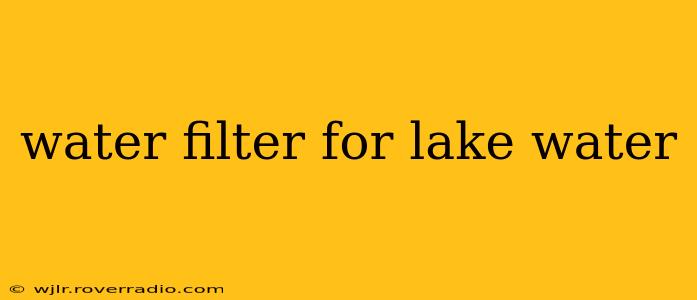Lake water, while beautiful, often presents challenges for those seeking safe, clean drinking water. Unlike treated municipal water, lake water can contain a variety of contaminants, ranging from sediment and bacteria to harmful chemicals and parasites. Therefore, selecting the right water filter is crucial for ensuring your safety and enjoyment of the outdoors. This comprehensive guide will help you navigate the world of lake water filtration, answering common questions and helping you choose the best system for your needs.
What are the contaminants found in lake water?
Lake water can contain a wide range of contaminants, varying significantly depending on the lake's location, surrounding environment, and season. Common contaminants include:
- Sediment: Sand, silt, and clay particles can cloud the water and affect its taste.
- Bacteria and Viruses: These microorganisms can cause various waterborne illnesses.
- Parasites: Giardia and Cryptosporidium are examples of parasites that can contaminate lake water and cause serious health problems.
- Algae and other Organic Matter: These can contribute to unpleasant taste, odor, and cloudiness.
- Chemicals: Runoff from agriculture, industry, and urban areas can introduce pesticides, herbicides, heavy metals, and other harmful chemicals.
Understanding these potential contaminants is vital in choosing an appropriate filter.
What type of water filter is best for lake water?
The ideal water filter for lake water depends on the specific contaminants present and your desired level of purification. Several options exist:
- Gravity Filters: These are simple and portable, suitable for removing sediment and some larger bacteria. However, they may not be sufficient for removing all contaminants, particularly viruses and chemicals.
- Pump Filters: These offer faster filtration rates than gravity filters and can remove a broader range of contaminants. They are also more portable than larger systems.
- UV Sterilizers: These use ultraviolet light to kill bacteria and viruses but don't remove sediment or chemicals. They're often used in conjunction with other filtration methods.
- Multi-Stage Filters: These combine several filtration methods (e.g., sediment filtration, carbon filtration, and UV sterilization) to provide comprehensive water purification. These offer the most thorough protection but are typically larger and more expensive.
- Water Filter Pitchers: Convenient for small quantities of water, but usually insufficient for extensive use or heavy contamination.
How do I choose the right water filter for my needs?
Consider these factors when selecting a lake water filter:
- Contaminant levels: Test your lake water to identify the specific contaminants present. This will guide your choice of filter type and capabilities.
- Flow rate: How much filtered water do you need per day or per use? Higher flow rates are beneficial for larger groups or frequent use.
- Portability: Will you be using the filter in a fixed location or while hiking/camping? Portability is a key consideration for outdoor adventures.
- Maintenance: How easy is it to clean and replace filter cartridges? Regular maintenance is crucial for optimal performance and longevity.
- Cost: Water filters vary significantly in price. Choose a filter that balances cost with performance and your budget.
What are the pros and cons of different lake water filter types?
This section requires a table comparing various filter types with their respective pros and cons. This will allow for a more digestible comparison of different options. (This would be included in a fully fleshed-out blog post)
How often should I replace my lake water filter cartridges?
The frequency of cartridge replacement depends on the filter type, the amount of water filtered, and the level of contamination. Always refer to the manufacturer's instructions for specific recommendations. Generally, you can expect to replace cartridges every few months to a year, depending on usage.
Can I use a regular household water filter for lake water?
While some household filters might remove some sediment and chlorine, they're generally not designed to handle the diverse and potentially harmful contaminants found in lake water. Using an inadequate filter can leave you vulnerable to waterborne illnesses. It's crucial to choose a filter specifically designed for lake or outdoor water purification.
Are there any safety precautions I should take when using a lake water filter?
Always follow the manufacturer's instructions carefully. Pre-filter your water to remove large debris before passing it through the main filter to prolong its lifespan and prevent clogging. Regularly inspect the filter for any damage or leaks. And, remember, even the best filter may not eliminate all contaminants, so proper boiling or other treatment methods might be necessary in some situations.
This guide provides a comprehensive overview of selecting a water filter for lake water. Remember that prioritizing safety and choosing the right filter based on your specific needs is paramount for enjoying clean and safe drinking water from natural sources.
